Rags-to-Riches of the Century: Francis Ngannou
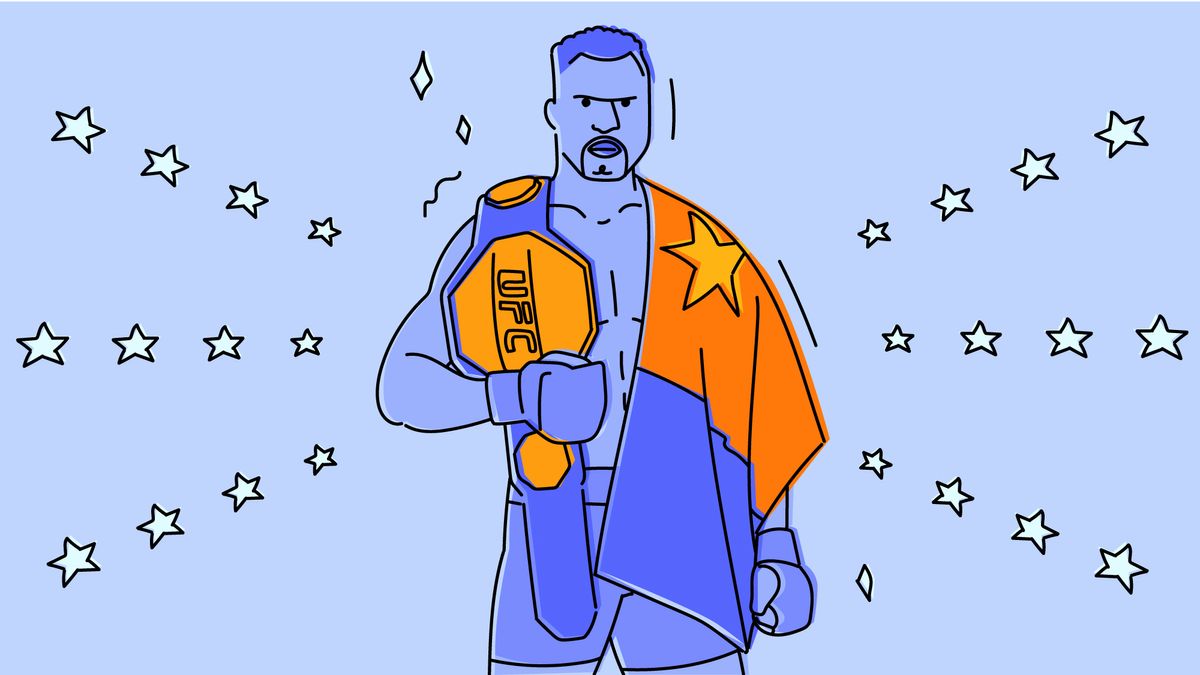
Most sports fans don’t know UFC Heavyweight Champ Francis Ngannou's story, and if you’re reading this, you’re probably not even a sports fan.
So why care about this sportsman?
Because maybe you care about a migrant’s journey. Or what it means to do hard labor as a child. Or just plain old the greatest rags-to-riches story of the 21st century.
Care because even if Francis Ngannou had gone on to become an accountant in Cleveland he’d be a Shackelton-like figure—his tale of overcoming adversity could be a Hollywood movie.
Except he didn't become a Cleveland accounant. He became World Champion.
Growing up in a Sand Mine
His story even starts like a folk tale.[1] Poor even by the standards of his native Cameroon, Francis lived with his grandmother in a one-room, brick-and-dirt house in the village of Batié. From the age of 10, he worked in a local sand mine to supplement their meager income,[2] but still often missed school because of lack of tuition, or was thrown out for being without a notebook and pen.
I hated the sand mine, I hated my life.
All through his schooling, he worked in the sand mine, after school and on weekends, but especially during the wet season:
That’s the wet season...so it rains all the time. Kids go to vacation...adults don’t want to work because it’s raining all the time. Guess what? That was our opportunity when they don’t want to work, so we have a chance to work. [We’d] get back home shaking [from the cold], because all day long it’s been raining.
Even when he could attend school, it meant waking at 5 am for a 2-hour trek each way. He often went without food for most of the day; even if he managed to get his hands on some breakfast, he’d ration it so he’d be able to make it through the day.
At school, he was visibly impoverished in his tattered school uniform and ostracized by the other students. But he recognized that being a child who worked to attend school in fact made him exceptional:
They were looking at me like I was nothing, but...I was more than them because I’m working. Even though what I have is less than what they have, I deserve what I have, I worked hard for it...They are just kids, they don’t deserve shit!
I’m going to do something that’s going to prove [to] these kids that I’m not beneath them.
Beyond Cameroon
After leaving school at 17, he worked odd jobs, eventually owning a motorcycle and working as a moto-taxi. Though local gangs attempted to recruit him, he wanted his path to be different from his father’s, who’d had a reputation as a street fighter.
He thought boxing could be a more positive outlet and started training at age 22, though he knew that any chance of achieving his dreams would require leaving Cameroon. So he saved money for the trip, and by the spring of 2012, at age 26, he was prepared to leave for Europe.
Before he left he spent a few weeks seeing his friends and relatives in his village, knowing it could be the last time he ever got the chance. During the visit, his mother even asked “why are you looking at me like this?”
But he couldn’t tell anyone because they’d invariably object to the immense risk he was taking. He just said he was “going to the North” and left some of his savings with his little sister, anticipating being robbed along the way. He knew the danger, but also thought:
I don’t want to live with the regret of not trying
Smuggled to Algeria
Francis first crossed into neighboring Nigeria by car and train, and then onto Niger. Travel through Nigeria had been straightforward because Cameroonians could enter legally, but once in Niger the situation changed:
There we started to be, like, illegal...we didn’t have a visa, so we start to have to deal with the police, with the border protection...you get caught, they ask you for money...they want everything...every thing of value that they see they will take it.
We’d wrap our money...and swallow it.
In Niger, he met with professional smugglers who’d take him into Algeria. The trip involved clinging to the side of a pickup along with 25 others as it raced across the Sahara desert:
You have to be lucky that the car don’t [break down] in the middle of the trip, because if the car [breaks down] in the middle of the trip. Most of the time, it’s over...you guys might just die.
Hanging on for dear life, he ignored the pain of his hands lest he fall off and certainly be left for dead. At one point a woman standing in the bed of the truck couldn’t hold her baby any longer and nearly dropped the child over the side, but the other passengers took turns carrying the infant for the 24-hour journey.
Severely dehydrated because they were allowed only minimal water, once they’d reached Algeria they came upon a well:
It was so dirty, with dead animals in it, birds everything. Man...I’m going to drink this water, and it might kill me. But...if don’t drink this water, I’m not lasting long. So you drink it.
While in Algeria, he used a fake passport to purport that he was from Mali and had visa-free access. As a visible “African” his false documents were checked often:
I give [the policeman] my ID, I look him straight to his eye...because when you look somebody in the eyes, your eyes call his eyes. [He thinks] “yeah, it might be him, because he’s so confident.” But I was afraid as shit!
He traveled to northern Algeria in order to cross into Morocco. At this point, the journey had gone by relatively quickly, only 2 weeks had passed since leaving Cameroon. Though it seemed that the worst was over, he had no idea what was yet to come:
At every step, you think the next step’s going to be easier...It always gets harder.
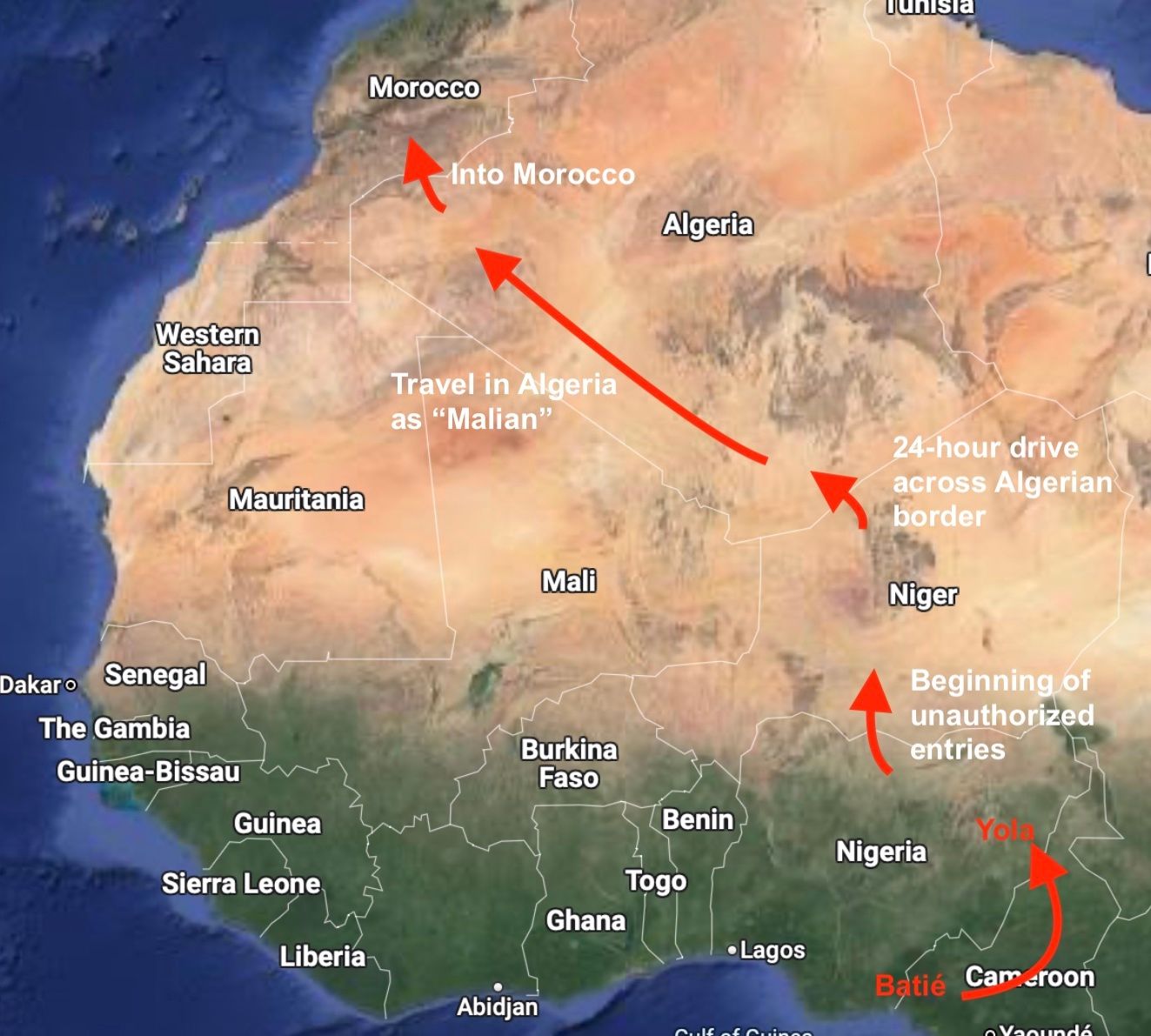
A Year in the Moroccan Woods
Morocco is a nightmare for migrants.
The European Union finances the DGSN (Moroccan border police) to control the flow of migrants across the Mediterranean and into the Spanish enclaves of Ceuta and Melilla. Apprehended migrants were usually beaten and dropped off in the desert on the border.
Ngannou tried crossing into Ceuta a few times, on one attempt he was cut badly by the barbed-wire border fence. He retreated to the Moroccan woods where the migrants lived but realized that he was bleeding to death, so went to a local hospital despite knowing that he’d be discovered.
While receiving stitches, he was arrested. As usual, after holding him in custody for a few days, he was taken south and thrown into the desert.
As with all the other times, he’d have to crouch, scramble and crawl his way back into Morocco to avoid being shot by border guards, guided by the lights of a distant Airport.
After 3 failed attempts to cross into Ceuta, Francis headed to Tangier to try his luck on the water. This meant sneaking to the shoreline with a crew of migrants and trying to cross the sea on literally an inflatable pool toy:
[The raft was] just a small one, the one that they use in [a] swimming pool...This is how we’re trying to get in the ocean.
He tried repeatedly, only to be thrown back into the desert after each attempt:
Sometimes you get caught even before you touch the water, and sometimes you get in the water, after a few hours you get caught.
Each boat had a “captain” who avoids chipping in to buy the boat in exchange for their skills and leadership. On one attempt, Francis’s boat made it onto the water, but the crew members carrying the paddles had been caught. They thought they’d need to turn back, but their Ivorian captain roused them to paddle with just their hands. Indeed, they did make it many miles across the sea but the border patrol eventually found them, knowing of their presence from having caught the paddle-holders.
The others on the raft surrendered, but their captain chose to slip into the water and try to swim:
As time goes by, you’re open to taking more risk. At first, you’re like “I don’t know about this, it’s risky”...and then after a time...“damn, whatever it takes, I’m doing it.” ...He was at that point, we weren’t there yet, he was there already.
Though they were all yet again caught, Francis counted his blessings:
We got lucky, we didn’t get beat up because [their] officer was there.
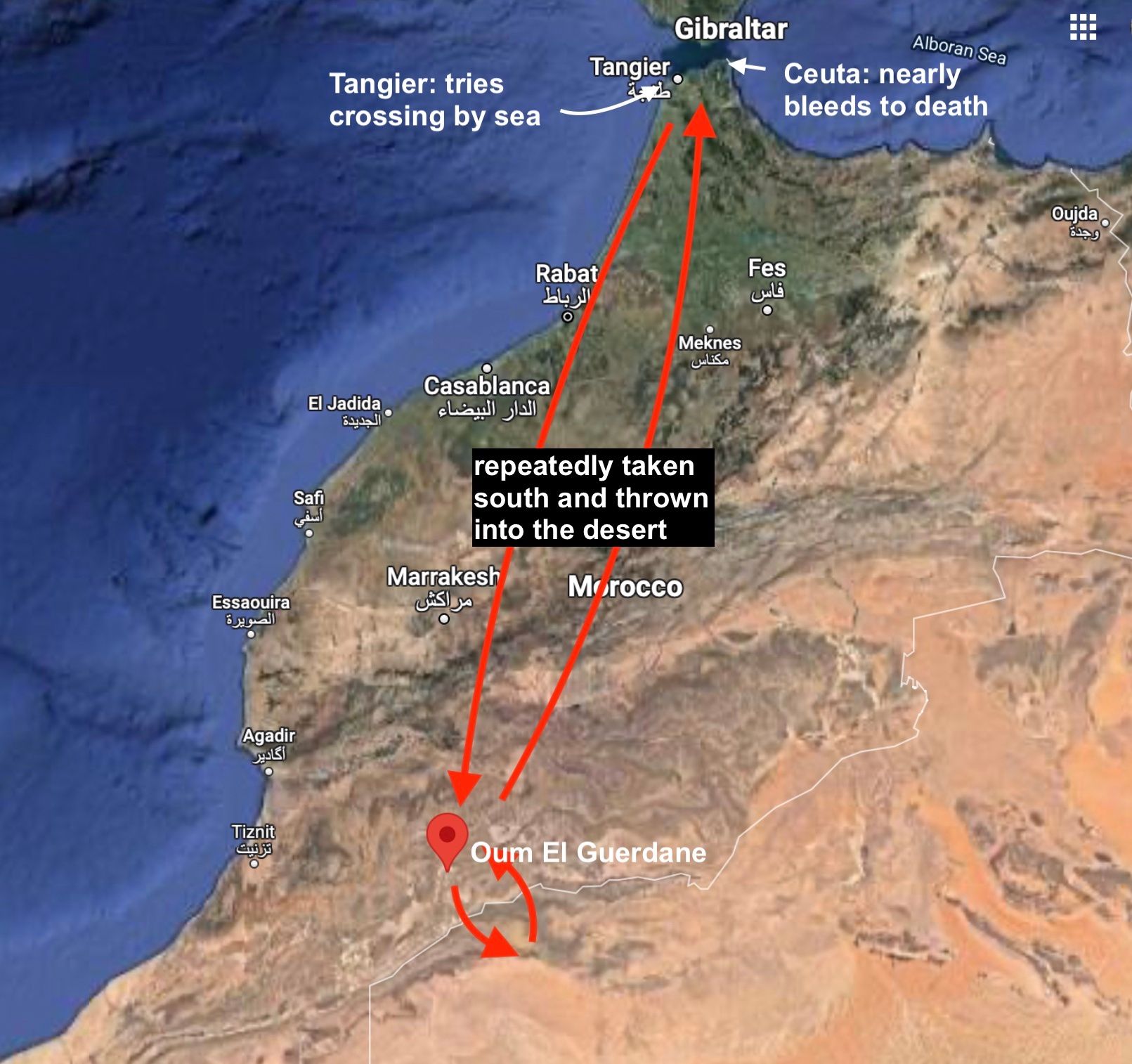
Captain Van Damme
Through his sheer number of failed attempts, Ngannou became experienced enough to captain his own raft.
On his first trip as captain, he waited for the earliest prayer of the day, knowing the guards would be occupied. The waves were high that day, and several other migrant boats didn’t even make it past the surf, but Francis alone was able to time the crashing waves and successfully pass the pounding waves.
His crew paddled for nearly 3 hours, making it into international waters and passing fishing boats. It looked as if they may have made it, but they happened to be spotted by a Moroccan Army ship and captured anew.
It was another failure, but his successful launch when others hadn’t made Francis’s reputation as a captain, and his crew would report:
“He’s a hell of a captain..named Van Damme.”
They always had [a] nickname for me.
Known for his martial aspirations, he’d been named after Jean-Claude Van Damme.
That would be the final attempt of the year. He’d left Cameroon in April of 2012, it was now December and too cold to make more attempts by sea. The migrants retreated to the woods to wait out the winter:
Cold all the time, no clothes, no food...you have to go to the market at nighttime, to go find food in the trash...sometimes arguing with rats in the trash...like: “hey get away from these tomatoes, it’s mine, these rotten tomatoes, it’s mine!”...go back in the forest and figure out how to cook that in [an] aluminum bucket.
Meanwhile, the police conducted raids on the woods:
[We were] living under plastic sheeting. You’d need to grab your plastic and blankets so the police won’t confiscate it, and you run and hide, sometimes for hours.
It was then that Ngannou resolved that his next time on the water would be the last. He was at that point, like the Ivorian captain.
Across the Sea on a Pool Toy
It would be his 7th time on the water.
Now a sought-after captain, he organized his final try. He instructed that the raft be covered with aluminum foil to evade radar, a tip he’d gleaned from a sympathetic border guard.
The crew waited for favorable weather, then paid off a taxi driver to secretly drive them down to the water. Their intended launch point turned out to be heavily patrolled though, so they walked a great way along the coast, eventually clambering down a seaside cliff.
The cove at the base of the cliff hardly even space to inflate their delicate raft amongst the jagged rocks and crashing waves. A tiny beach provided just enough space to launch from.
Most of the migrants were first-timers, so had never experienced firsthand what would be required of them. Newly facing the crashing waves and open sea, Francis knew that some would try to turn back, but any who did would eventually be caught and alert the guards to the others. In a scene reminiscent of Roman soldiers who were more scared of their commanding Centurions than of the enemy:
I have to change... how I talk. I have to ... not only motivate them...you have to scare them, they have to [be more] scared of you, than of the waves.
If somebody quits, you’re getting caught. So I took a paddle, just start yelling at them, feinting [swings at] them.
[They] get scared of the waves, but turn around see me, get scared of me.
The crew tried to enter the surf but were repeatedly turned around by the thunderous waves. On the 3rd try though, they made it into the water.
They’d made good progress on the open water when they noticed a helicopter following overhead. The presence of the helicopter would certainly alert the Moroccans, but could also be used to guide potential rescuers to their location. Using a cell phone with a Spanish SIM, Francis took his chances and called the Red Cross for help. With the helicopter as a landmark, a Red Cross ship was able to find them and take them to the Spanish coast.
It was April 3rd, 2013, exactly one year had passed since Francis had left Cameroon.
Spanish Prison to Paris Parking Garage
Moments before being picked up by the Red Cross, the migrants threw any identity documents, genuine or otherwise, into the sea. In Algeria, Francis had been Malian, in Morocco, Senegalese, but Spain did not have a repatriation policy with Cameroon, so in Spain, he was finally again Cameroonian.
There he was taken into custody:
They call it a detention center... but man this is a harsh prison...at some point...I think I was good being in the forest of Morocco, at least I was free.
After 2 months of interrogation and imprisonment in Spain, he was released. A local charity provided temporary shelter, but his goal was not Spain. Free and unhunted for the first time in a year, he called his family in Cameroon one last time to scrounge the last of his savings together in preparation for the final leg of his trip.
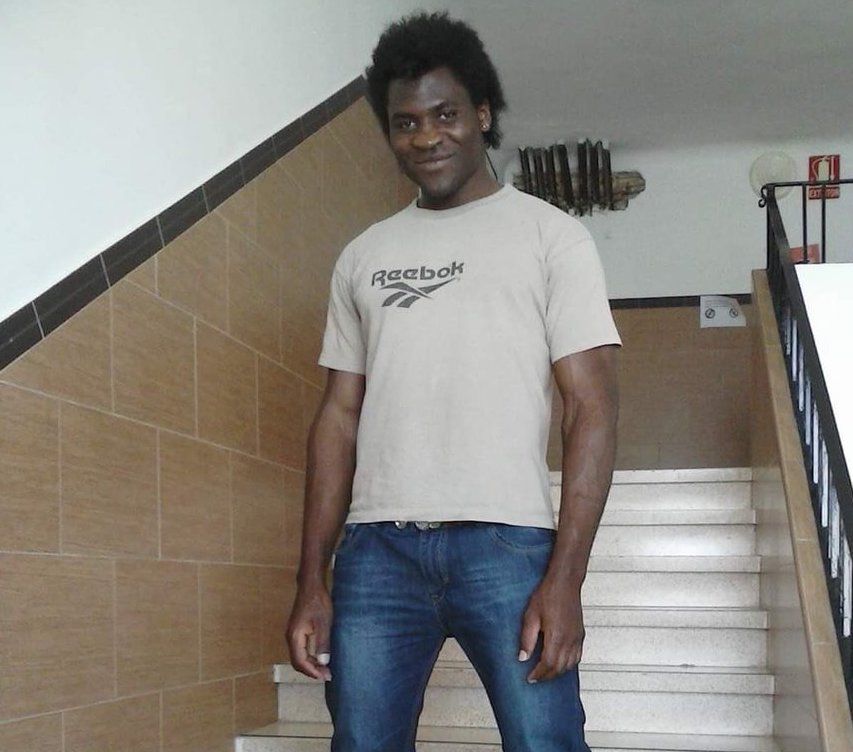
He’d originally intended to go to the UK, as it was a better fit for his boxing aspirations. Now though, he’d grown weary of migrant life and could travel freely in most of continental Europe.
Many other migrants were heading to France, and he went with them. There, he went with a friend to the local Malian community, but was shocked to the see the poor conditions in which they lived:
I almost died for this? This is France that they’re talking about?
He resolved not to live with the Malians or in a homeless shelter, believing that either would trap him in that dismal state of affairs:
I’m getting out of here... this kind of thing drowns your energy...So I found a parking lot.
He moved into the bottom of a parking garage and immediately began searching for a gym:
The next day I found a boxing gym, all day long I was walking, asking
Upon finding a gym, he explained his situation to the trainer: though he was homeless, he didn’t want anything other than a place to train, for one day he would be a world champion.
The trainer accepted him and even gave the penniless Ngannou 50 euros. It was enough for shorts, a t-shirt, and a towel. He was without the boxing basics of hand wraps and a mouth guard on his first day of training, but after a 14-month journey, he was ecstatic just to have finally begun.
UFC Heavyweight Champ
After 2 weeks, the coach told him he had potential, but that he should try mixed martial arts (MMA) instead of boxing. Boxing required connections and a promoter, while Ngannou could get some paying MMA fights right away.
At the time, Francis didn’t even know what MMA was, and was still dead-set on becoming a boxer. However, he’d been volunteering at a charity that happened to be across the street from the MMA Factory gym. When his boxing gym closed temporarily, he headed there to train. Owner and fellow Cameroonian Fernand Lopez realized Ngannou was homeless when he asked if he could leave his gear at the gym, and began letting Francis sleep at the gym.
Only training boxing at first, he eventually started MMA classes out of curiosity and a desire to stay in shape. Lopez recognized Francis as a phenomenal athlete and fast learner, not to mention a towering and muscular 6’4”.
He subtly encouraged Francis to pick up MMA, and eventually, Francis decided to see how he would fare in a local MMA tournament. He won his first fight by submission, despite not even knowing which technique he was using, by following directions shouted from the side of the ring.
After his first tournament, Francis went on an impressive winning streak despite not having begun training until the age of 27. Known for tremendous knockout power, his fights were often dramatic crowd-pleasers and in 2015 was signed to the UFC. His iconic knockout of Alister Overeem in 2017 earned him an 11-1 record and a shot for the title.
His title fight was against reigning champ Stipe Miocic. Francis’s run-up to the title was so sensational, that even as one of the all-time greats, Miocic was somehow the betting underdog.
It was a one-sided affair: Miocic deftly avoided punches and dominated an exhausted Ngannou with wrestling and relentless ground strikes for 5 rounds. It was clear that Ngannou’s relative inexperience had left weaknesses with pacing and grappling that the veteran fighter could exploit.
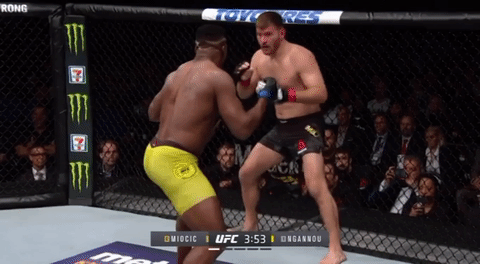
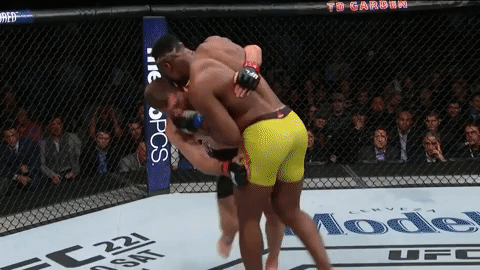
Following this loss, Ngannou faced up-and-comer Derrick Lewis in what is regarded as one of the worst and most uneventful heavyweight fights of all time. Bizarrely tentative and refusing to engage, Ngannou lost via decision in a fight so boring that UFC president Dana White called it an “abomination”.
The experience of being so thoroughly dominated by Miocic had clearly shaken Francis deeply.
He knew serious changes were needed and made the painful decision of moving from Fernand Lopez, his first coach who’d helped him out of homelessness, to elite MMA camp Xtreme Couture.
Reflecting on his loss to Miocic:[3]
Nobody wants to lose, but I think at some point I needed a fight like that...my rise was very fast, very quick, and I didn’t have time to understand a lot of things…the fight against Stipe allowed me to understand many of those things.
He’d come to recognize his weaknesses and the necessity of addressing them if he ever were to be champion. Training with the best of the best, a more self-aware Ngannou would go on a 4-fight tear in which no opponent lasted more than 71 seconds against him, including two former UFC heavyweight champs.
Now armed with defensive wrestling skills and calculated striking, he again faced Miocic for the title in March of 2021.
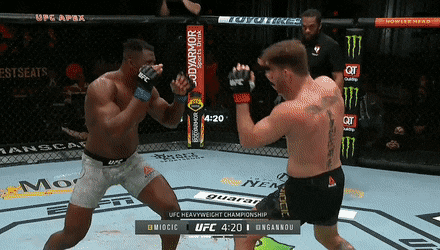
Miocic lasted 6 minutes. Nearly a decade since first leaving Cameroon, as promised, Francis Ngannou was World Champion.
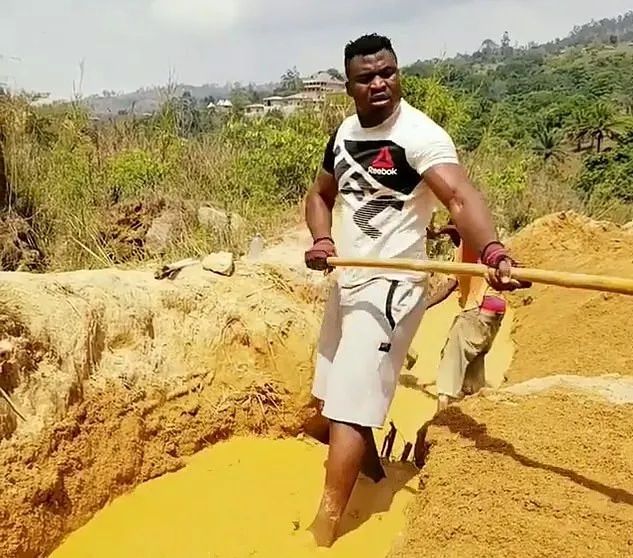
As told in Ngannou’s interview on the JRE MMA #99 Podcast. ↩︎
Not even an iron or coal mine, he was child labor on a literal dirt farm. ↩︎
As told to MMAfighting.com ↩︎
Thanks to Uri and Kaamya for feedback on drafts of this.